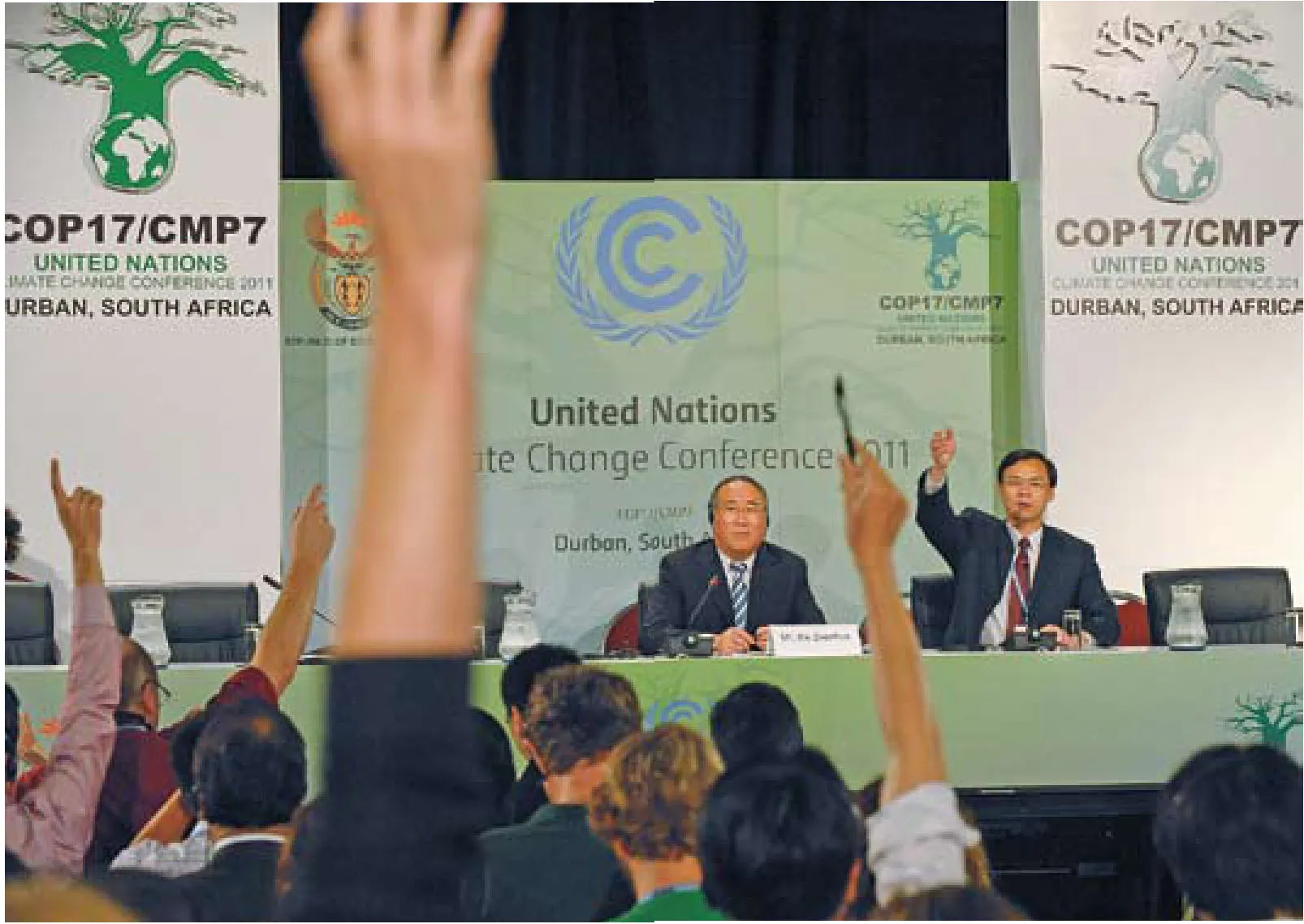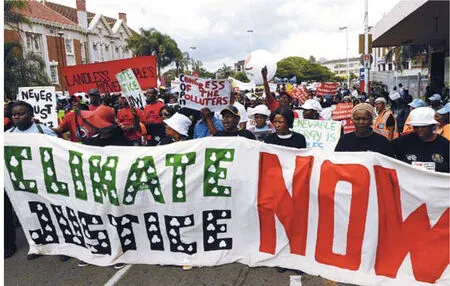Imperfect But Important
By YU YAN
Imperfect But Important
By YU YAN
The UN Climate Change Conference concluded in Durban with a package of resolutions that could pave the way to something bigger
Though the results of the UN Climate Change Conference in Durban are not perfect, at least they are progress in a phasal sense, said Chinese and foreign analysts.
The UN Climate Change Conference was completed after a prolonged negotiation in Durban, South Africa, on December 11, 2011, two days later than planned due to serious disputes among negotiating parties. After difficult negotiations, a package of resolutions was passed by representatives from more than 200 countries and international organizations.
The resolutions include agreements on the implementation of the second commitment period of the Kyoto Protocol, the launching of the Green Climate Fund and other issues.
Results
“The conference in Durban reached agreement on the two major concerns of China and other developing countries: the second commitment period of the Kyoto Protocol and the Green Climate Fund,” said Zhou Dadi, Director General (emeritus) of the Energy Research Institute affiliated to the National Development and Reform Commission (NDRC) of China.
“The conference charted the future for the global climate action after this conference and before 2020. Now the world can start to discuss plans after 2020. This is significant progress,” said Zhou.
Zhou’s opinion was echoed by UN Secretary General Ban Ki-moon. The package of resolutions is a signifcant step forward in global climate efforts, said Ban.
The resolutions passed at the closing of the conference were not perfect, but they were a landmark for global climate action, said Maite Nkoana-Mashabane, South African Minister of International Relations and Cooperation and also president of the just concluded United Nations Climate Change Conference.
According to the resolutions, an Ad Hoc Working Group on the Durban Platform for Enhanced Action will be established. It will be responsible for formulating a legal instrument or legal result applying to all parties to the United Nations Framework Convention on Climate Change. The establishment work will start in the frst half of 2012, and be completed no later than 2015. Based on this legal instrument, all the parties to the convention will discuss emissions reduction beginning from 2020.
What’s more, the second commitment period of the Kyoto Protocol will be offcially approved of at the next UN Climate Change Conference in Qatar in 2012, and come into effect in 2013. And a new climate treaty including the United States and emerging countries such as China and India should be reached before 2015 and come into effect after 2020.
The Kyoto Protocol is the only legally binding agreement that sets targets for major developed countries. It was passed in December 1997 and came into effect in February 2005. Its frst commitment period will expire at the end of 2012.
Moreover, the conference decided to offcially launch the Green Climate Fund and establish its governing instrument. Building on the commitment by developed countries to transfer $100 billion a year by 2020 to developing countries for adaptation and mitigation, the Green Climate Fund will be essential for channeling funds to developing countries.
Also, the package of resolutions includes documents on monitoring and verification rules of emissions reduction, forest protection and clean-energy technology transfer to developing countries.
Disputes
“However, the disputes among the negotiating parties will exist for a long time,” said Zhou.
The United States has held a negative attitude toward climate change. Even when the U.S. economy was in good shape, it presented little will to contribute to this international pub-lic cause. Neither did it show the willingness of aiding developing countries, said Zhou.

LI QIHUA
“Now amid the fnancial crisis, it is diffcult for President Obama to put the policies that he brought forward into practice,” said Zhou.
Obama confessed the diffculty in pushing forward the climate actions in the United States was due to obstacles from the U.S. Congress.
“I talked about reducing America’s dependence on oil when I was running for President, and I’m proud of the historic progress that we’ve made…But I’ve got to be honest. We’ve run into the same political gridlock, the same inertia that has held us back for decades,” said Obama in a remark on America’s Energy Security at Georgetown University in Washington, D.C., on March 30, 2011.
The resolutions reached at dawn didn’t bring light for the public. Instead, it cast shadow on global climate cooperation, said Kumi Naidoo, Executive Director of Greenpeace, an independent global organization devoted to protecting the environment and world peace.
The United States and some other countries that hinder the climate talks have successfully kept a door for themselves. If the door is not locked, the United States will possibly keep delaying the talks on a legally binding global climate treaty that the world needs urgently. This will be a disaster for the Earth that all human beings lived on, said Naidoo.
Although the environmental protection force is strong in the EU, currently it is suffering from huge economic diffculties. What’s more, it doesn’t understand the real condition of developing countries but insists that the Kyoto Protocol should cover emerging economies such as China and India, said Zhou.
During the conference in Durban, the EU called for a global climate framework engaging all major economies. It insisted that the global climate action must be led by the major economies in both the developed and the developing worlds since they are the biggest emitters.
“Developed countries lack the political will to reduce emissions and provide fnance and technology transfer to support developing countries. The lack of political will is the main element that hinders cooperation on addressing climate change in the international community,” said China’s View on the Durban Conference, a press release issued by the Chinese delegation in Durban on December 10, 2011.
“The Durban Conference did not succeed in accomplishing the negotiations under the Bali Roadmap. The implementation of the Cancun Agreements and the Durban Outcome will not be achieved in the short run. A heavy load of work ahead on the post 2020 arrangement needs to be done in order to enhance the implementation of the convention,” said the release.

LI QIHUA
There is no legally binding international treaty that has no political background. Though the issue of climate change involves the world’s common interests, it is still closely related to the current world political pattern. Developing countries can’t be too naïve and expect developed countries to voluntarily take international responsibilities, said Zhou.
China can’t give up defending the interests of developing countries in the international negotiations, said Zhou.
Xie Zhenhua, China’s top climate negotiator and Vice Chairman of the NDRC, also responded in Durban on December 7 on the desire of more responsibilities from China.
“China’s total emission amount has attracted global attention, but please don’t forget, China is a developing country with a population of 1.32 billion people. China’s per-capita GDP just surpassed $4,300. There are still 128 million people living on less than one dollar a day in China,” said Xie.
China faces the tough task of promoting development, eliminating poverty and improving people’s livelihoods. However, China has overcome all the difficulties and made arduous efforts in dealing with climate change, he said.
For instance, from 2005 to 2010, China’s energy consumption per unit of the GDP dropped 19.1 percent, or a reduction of 1.46 billion tons of carbon dioxide emissions.
The Chinese Government has attached great importance to the issue of climate change, and regarded dealing with climate change as an important strategy and persistent policy in China’s economic and social development, said Xie.

